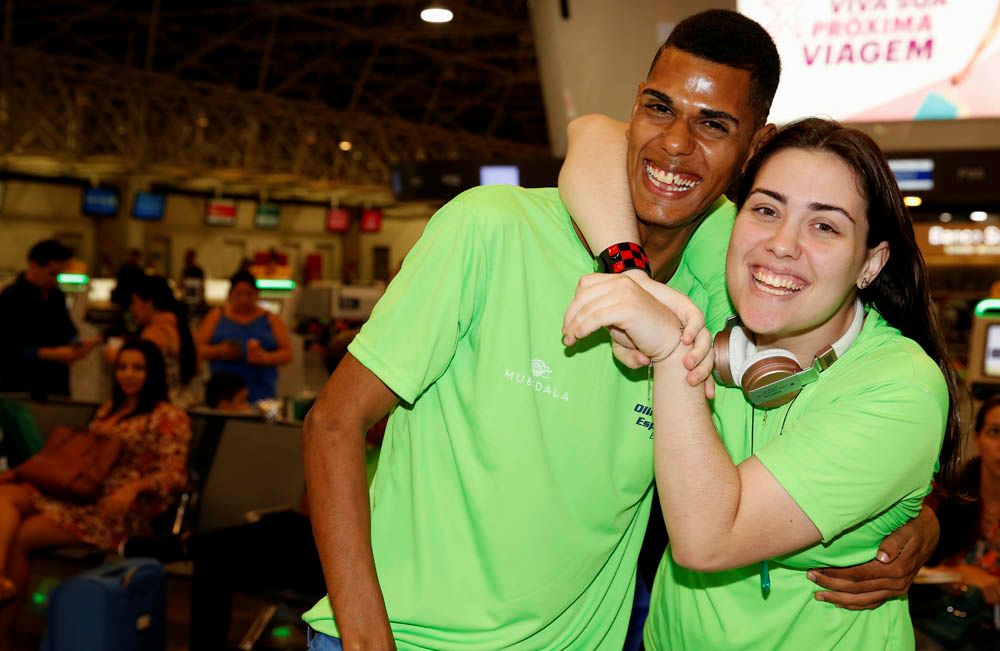São Paulo – Thirty-six Brazilian athletes will compete in the Special Olympics in Abu Dhabi, the UAE as of Thursday (14). Fifty-one Brazilians have travelled for the event, including intellectually challenged athletes, partner athletes (who are team members with no disabilities), technicians, delegates and medical staff. Pictured above are two athletes in the airport before boarding their flight.
“This is very special, a brand new, a once-in-a-lifetime thing for them,” said to ANBA this Wednesday (13) George Henry Castilho Millard, the president of Olimpíadas Especiais Brasil, the Brazilian arm of Special Olympics, a global movement designed to promote sports among intellectually challenged persons.
Millard met with the Brazilian delegation before their departure to Abu Dhabi and said they were all eager, asking questions about how people speak and dress in the UAE. “Some have never left their cities before. This is what we call an opportunity in the Special Olympics,” Millard said.
Although the actual games begin on Thursday, the athletes did preparatory work and posted photos on Facebook this Tuesday (12). The Brazilians will compete in open waters, track and field, bocce, indoor football, rhythmic gymnastics, tennis, swimming and beach volleyball.
The Special Olympics take place every four years. During the last edition, in Los Angeles, USA, the Brazilian team brought home 38 medals, 15 of which were gold. But Millard explains that the amount of medals doesn’t matter. “Special Olympics are about inclusion, not competition,” he argues.
Unlike the Paralympics, a performance-oriented event for the physically impaired, the Special Olympics feature several levels of competition, one of them being high performance. Athlete compete against people at similar levels.
The Brazilian team travelled with sponsorship from Mubadala, the Arab investment company, which became aware that there were financial issues. A project had been approved last November for funding from Brazil’s Sports Incentive Law, but the process got halted as the new administration began and set out to review ongoing procedures, according to Millard.
One of the solutions would be to get a loan from Special Olympics International, which Olimpíadas Especiais Brasil is affiliated with, but Millard said repaying would be a problem. A crowdfunding action was made, but the cash it raised fell short of the required amount. As a result, instead of 100 people travelling, only about 50 did. The team had already been registered once Mudabala came to the rescue.
The Abu Dhabi Special Olympics will welcome over 7,500 athletes from some 190 countries. Millard points out that that is double the amount of the Paralympics, whose last edition saw 3,000 athletes. It’s also just a little less than the regular Olympics, which saw about 10,000 athletes. According to him, the Special Olympics are the biggest humanitarian sports event in the world.
Besides taking care of Brazilian participation in events worldwide, Olimpíadas Especiais Brasil works on multiple fronts to encourage sports among the intellectually challenged. Last year, it held 140 events. “It’s a movement designed to create opportunities for intellectually challenged people through sports,” says Millard. Approximately 50,000 people are involved in these activities in Brazil, according to him.
The Brazilian delegation travelled to Abu Dhabi on March 8. They have already joined the Host City Program, whereby one city in the host country offers cultural events and community involvement. The Brazilians were welcomed in Dubai. Although the host city is Abu Dhabi, track and field and swimming events will take place in Dubai.
The former Brazilian football player, Romário de Souza Faria, who’s currently a senator, will also be in Abu Dhabi alongside the Brazilian team. An ambassador for Olimpíadas Especiais Brasil, he will represent his counterparts in the country.
The Abu Dhabi Special Olympics are set to end on March 21.
Translated by Gabriel Pomerancblum




